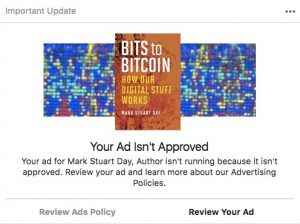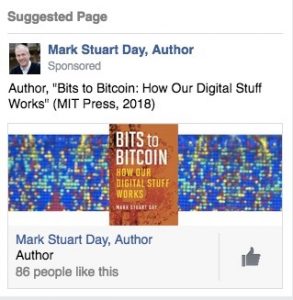Mr. Kafka, Your Ad Will Be Reviewed Shortly
or
My Book Can’t Be Advertised on Facebook: An Anecdote of Why We Can’t Trust Facebook to Police Content
I have recently joined a select group of people whose ads are too dangerous for Facebook to publish. This development came as a surprise to me, since I’m an author with a newly-published book about computer systems – which is what I’m trying to advertise. I don’t think I match the typical profile for a provocateur or scammer: I’m in my 50s, I have a doctorate from MIT and a modest pile of patents, and I spent decades in industry before turning to teaching and writing.
Stranger yet is that I wouldn’t have even proposed the ad if Facebook itself hadn’t suggested it. Plus, the ad is unchanged from what Facebook proposed. Here’s the ad that’s too dangerous for Facebook:
For some reason, advertising myself and my book is simultaneously something that Facebook wants me to do and refuses to let me do. The reason for their refusal is opaque and meaningless on its face: overall, I feel like a character in a Kafka story.
I’ve been a Facebook user for a few years, but I only recently created a business page (“Mark Stuart Day, Author”) to help me promote my book. I’m not sure it really helps, but the sad reality of marketing a book – and perhaps marketing in general – is that it’s hard to be sure about what really helps. I have posted book-related news on my author page a couple of times, and I have paid small amounts of money ($10 – $20) to have those items appear in the newsfeeds of strangers as “Sponsored” items. So Facebook and I seemed to have things worked out. But then came this incident.
Facebook suggested a promotion of the author page itself. To understand what happened next, it’s important to know that the title of my book is Bits to Bitcoin: How Our Digital Stuff Works. The book isn’t primarily about Bitcoin – that’s just the destination of the narrative flow through various topics about how our digital infrastructure works. It’s a book about how networks work, how the web works, how public-key cryptography works, and similar topics.
I’m sympathetic to Facebook’s desire to cut down on cryptocurrency scams, so I don’t object to their review of the ad. I can see how my book could get flagged by Facebook, based on the title alone. I also know that there are bound to be errors in that process. It makes sense that Facebook would prefer false positives (blocking ads that are actually harmless) to false negatives (publishing ads that are actually harmful). So it didn’t particularly bother me when the ad was rejected; I just moved on to the appeals process.

The appeals process is the point when things got weird. The original rejection said I had violated Facebook’s policy against offering “financial products or services.” So as requested by Facebook, I wrote a message explaining my situation: I wasn’t offering a financial product or service, I was offering a book about computer systems. I provided a URL for my author web site and another URL for my (reputable, academic) publisher’s web site. I figured that would be sufficient information – perhaps even overkill – for the appeals process to release the ad.
Instead, I received a reply that would soon become eerily familiar:
“Thanks for writing back.
Sorry for the inconvenience, but our say on this matter remains unchanged. However, I appreciate your feedback, and have passed it to our team. We’ll update you if there’s progress on this.
Meanwhile, I encourage you to read our policy site so you can create compliant ads.
Have a good day.
Thanks, [First name of Facebook person]
Facebook Ads Team”
I didn’t realize it at the time, but this marked my entry into a situation where every action produced the same result. (A computer scientist might say I had reached the “fixpoint” of the appeals process.)
I wrote back and explained that they were not being very helpful, that I had provided information to distinguish myself from what was forbidden by the policy, and that they hadn’t responded to any of that substance. But no matter what I wrote, I received the same reply – identical except for the name. My first reply was from “Tini” and two later ones were from “Connor.” I have no reason to believe that these are real names, and I don’t even have any reason to believe that people were involved. Based on my experience, these could just as easily have been produced by a simple program that sent out the “sorry but we’re not changing” text no matter what I wrote. (As an aside: this interaction seems like unbelievably bad design, just as a customer relations issue).
Looking around Facebook for another solution to the impasse, I ran across the opportunity to register for special cryptocurrency-related terms and conditions. Although this option is not made clear by either the emails I received or the policy site that they kept referencing, it seemed plausible that this registration is what Facebook wants me to do before they let me advertise my author page. But that seems like a pretty unappealing approach.
To register with them, I would have to sign a Facebook Cryptocurrency Ads Addendum. It’s a page or two of typical corporate legalisms, establishing that they have all the power and none of the responsibilities in a relationship with me. Among the clauses is one that says I agree to provide Facebook with anything (including legal opinions!) that they “in their sole discretion” decide they might need. Another clause says I’m required to give Facebook my assistance in the event of regulatory action against Facebook. And it’s worth noting that I have to sign this addendum simply to register – the terms of the agreement bind me, regardless of whether Facebook approves my ad or not.
I suppose that if I were actually marketing cryptocurrency, these terms would still seem a little annoying – but I could view them as a cost of doing business. But it feels weird to be the author of a book and agreeing to all kinds of anticipatory entanglements with Facebook. I wouldn’t have to do this if I had written a diet book or a novel. How can this company be so foolish as to insist that any book with “Bitcoin” in the title has to be treated like a controlled substance?
So now I have the Book That Must Not Be Named. Or since it’s my author page that’s the problem, perhaps it’s more accurate to call me a Pariah Author. I expect I’ll continue to advertise my book on Facebook from time to time in contexts that let me avoid tripping their algorithms. Perhaps I’ll advertise “Bits to Bit****” and see if that works. Whatever I do, I would guess that occasionally I’ll have an ad rejected.
But the experience certainly convinced me of one important point: it would be a huge mistake to expect Facebook to be even halfway competent at policing online content. Whatever the right solution might be, depending on Facebook’s current approach is hopelessly naïve.
